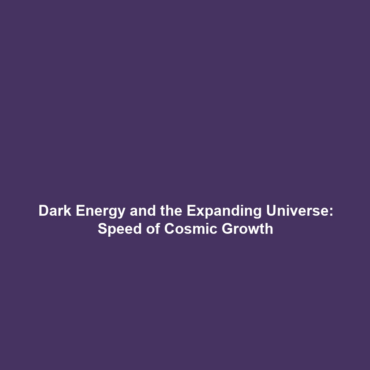The Role of Philosophy in Understanding Dark Energy and Matter
The enigmatic realms of dark energy and dark matter form the backbone of modern cosmology. Yet, while empirical science unveils numerous insights into these phenomena, philosophy plays a crucial role in shaping our comprehension of their implications. In this article, we delve into how philosophical inquiry enhances our understanding of dark energy and matter, offering insights that transcend mere scientific observation. This intriguing intersection of philosophy and astronomy provides a profound context for the ongoing dialogue around dark matter and dark energy.
Key Concepts in Philosophy’s Role
To grasp the significance of philosophy in understanding dark energy and matter, we must first outline the relevant concepts:
1. Epistemology and the Limits of Knowledge
Epistemology, the study of knowledge, is foundational in addressing questions about what we can know regarding dark matter and energy. Philosophers challenge scientists to consider the limitations of empirical data and observable phenomena in the quest to understand the universe.
2. Metaphysics and the Nature of Reality
Metaphysical inquiries address the fundamental nature of reality and existence. These discussions are crucial for framing the debate around the unseen components of our universe, such as dark energy, prompting deeper examination of what constitutes matter and its properties.
3. The Interface of Science and Philosophy
Philosophy encourages a reflective stance towards scientific theories, scrutinizing the assumptions and implications underlying theories of dark matter and energy, thus fostering a critical approach to scientific understanding.
Applications and Real-World Uses
The intersection of philosophy with dark matter and dark energy has practical implications across various fields:
- Astrophysical Hypotheses: Philosophical discourse aids in shaping astrophysical models, influencing how astrophysicists conceptualize dark matter and energy.
- Ethical Considerations: Addressing ethical questions surrounding scientific practices and technology, philosophy informs discussions about responsible scientific inquiry and funding in related research.
- Public Understanding: Philosophy improves public engagement with science, promoting a deeper appreciation for the complexities of cosmological phenomena.
Current Challenges
Despite its contributions, the role of philosophy in understanding dark energy and matter faces several challenges:
- Interdisciplinary Barriers: Communication gaps between philosophers and scientists can hinder collaborative efforts.
- Abstract Nature of Concepts: The highly theoretical nature of dark matter and energy may challenge public understanding and acceptance.
- Dynamic Scientific Landscape: Rapid advancements in cosmology can outpace philosophical analysis, leading to outdated frameworks.
Future Research and Innovations
The future of research in dark energy and matter will likely see philosophy playing an even more significant role:
- Philosophical Implications of New Discoveries: As new discoveries unfold, philosophical insights will guide the interpretation of results and their implications for our understanding of the universe.
- Innovative Theoretical Frameworks: Upcoming research may inspire new theoretical frameworks that integrate philosophical concepts with empirical findings regarding dark matter.
- Enhanced Education and Outreach: Philosophical perspectives might lead to innovative educational programs that demystify dark matter and energy for broader audiences.
Conclusion
Philosophy serves as a vital lens through which we can better understand the intricate phenomena of dark energy and dark matter. Its contributions guide scientific inquiry, provoke theoretical exploration, and enhance public comprehension of our universe. As we advance into a future filled with potential discoveries, an integrated approach—bridging both philosophy and science—remains essential. For further reading on this topic, explore related articles on [Cosmology’s Foundations](#), [Philosophy of Science](#), and [The Mysteries of the Universe](#).


